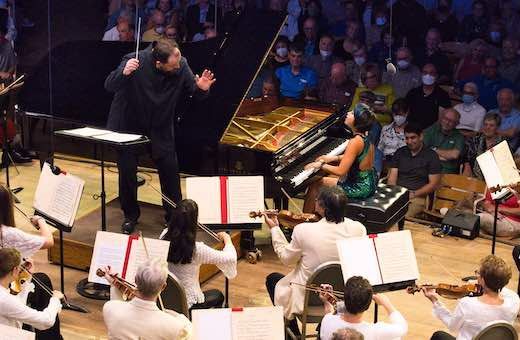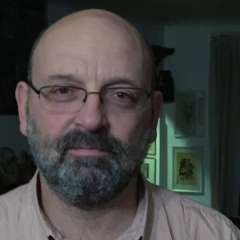After a tentative 2021 season, this year’s Tanglewood Festival returns in its full glory. The Boston Symphony Orchestra’s Music Director, Andris Nelsons, decided to start proceedings with a three-day weekend of 20th-century American and Russian music also including new works by Carlos Simon and Helen Grime. The centrepiece of Friday’s inaugural programme was supposed to have been Leonard Bernstein’s The Age of Anxiety, but unfortunately soloist Jean-Yves Thibaudet – a frequent visitor here – had to withdraw due to a death in the family. Yuja Wang kindly agreed to replace him, but that meant switching to a staple of the 19th-century repertoire, Franz Liszt’s Piano Concerto no. 1 in E flat major.

Wang has played the concerto multiple times during this season, on both sides of the Atlantic. Nevertheless, the freshness of her transformative approach was unquestionable. She succeeded in bringing out “the self-searching quality” – as Wang herself referred to it in a recent interview – of the score, too often used by pianists as merely a vehicle for displaying their prowess in hard-hitting and in navigating the octave runs. From the very first bars, she proved once again that, as terrifyingly precise as her technique is, her playing has a fluidity that transcends any considerations of difficulty. The slower, meditative pages had a Chopinesque, rhapsodic quality with amazingly suggestive, feather-like pianissimos. The piano-triangle dialogue evoked birds happily chirping. Wang did not shy from dictating the pace of her approach to a concerto conceived as a single, large movement, accelerating or slowing down whenever she felt necessary. Nonetheless, the harmony between soloist and orchestra was without fault (except, maybe, during the very last climax). In the same Lisztian spirit, Wang returned for a dazzling encore that she often plays: Vladimir Horowitz’s Variations on a theme from Bizet’s Carmen.
The festival began with Bernstein’s Opening Prayer, a pièce d’occasion written for the reopening of Carnegie Hall in 1986. Alternatively renamed Benediction, when included in the two-movement Jubilee Games and again as the last movement of his 1989 Concerto for Orchestra, the six-minute work starts with a solemn brass introduction, followed by a heartfelt oboe-intoned melody taken over by the strings. Finally, a solo baritone (here the sensitive Jack Canfield in his BSO debut) sings a brief benediction in Hebrew, extracted from Numbers, and part of the Jewish liturgy for the morning service. This might not be one of the composer's most significant works but, starting the Tanglewood season, it paid homage to the very deep relationship between Bernstein, the BSO and this wonderful place in the Berkshires.
Bernstein’s oversized shadow was still present in the Koussevitzky Music Shed during the rendition of Stravinsky’s The Rite of Spring. Nelson’s interpretation still owes a lot to Bernstein’s visceral, flamboyant style of conducting, even if now he seems a tad more inclined towards a cartesian, analytic approach to the score, in a Boulez/Salonen mold. Stravinsky’s rhythmic oddities and occasionally overemphasised dissonances were rendered with vigour and astonishing accuracy. Details were well shaped and their individuality always considered as part of an overall arch, Nelsons being one of the great masters of gradually building expectations. This Rite was never about striking loud decibels, but an exercise in enveloping the audience in a cocoon of sound. Almost all solo contributions – Nelsons reserved a special accolade for principal bassoon Richard Svoboda – were exquisite, showcasing a BSO in great shape at the beginning of this new summer season.


